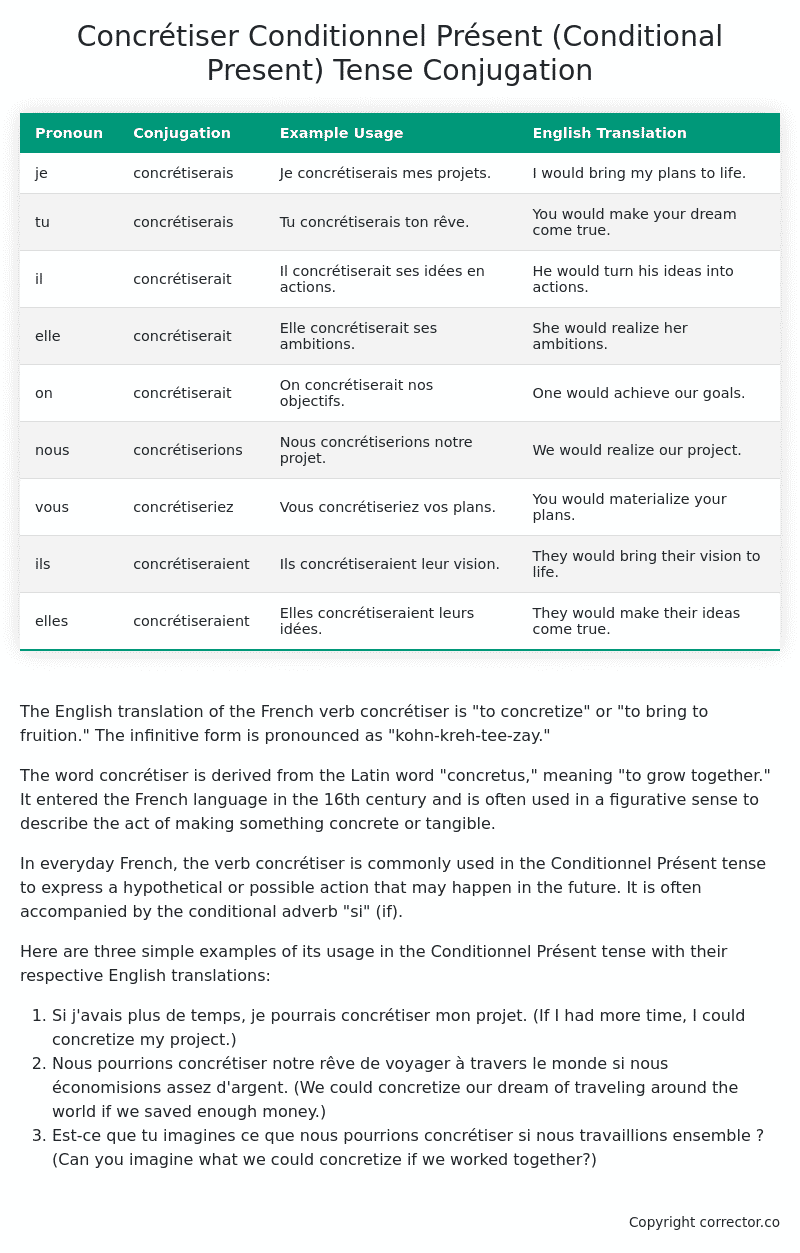Conditionnel Présent (Conditional Present) Tense Conjugation of the French Verb concrétiser
Introduction to the verb concrétiser
The English translation of the French verb concrétiser is “to concretize” or “to bring to fruition.” The infinitive form is pronounced as “kohn-kreh-tee-zay.”
The word concrétiser is derived from the Latin word “concretus,” meaning “to grow together.” It entered the French language in the 16th century and is often used in a figurative sense to describe the act of making something concrete or tangible.
In everyday French, the verb concrétiser is commonly used in the Conditionnel Présent tense to express a hypothetical or possible action that may happen in the future. It is often accompanied by the conditional adverb “si” (if).
Here are three simple examples of its usage in the Conditionnel Présent tense with their respective English translations:
- Si j’avais plus de temps, je pourrais concrétiser mon projet. (If I had more time, I could concretize my project.)
- Nous pourrions concrétiser notre rêve de voyager à travers le monde si nous économisions assez d’argent. (We could concretize our dream of traveling around the world if we saved enough money.)
- Est-ce que tu imagines ce que nous pourrions concrétiser si nous travaillions ensemble ? (Can you imagine what we could concretize if we worked together?)
Table of the Conditionnel Présent (Conditional Present) Tense Conjugation of concrétiser
| Pronoun | Conjugation | Example Usage | English Translation |
|---|---|---|---|
| je | concrétiserais | Je concrétiserais mes projets. | I would bring my plans to life. |
| tu | concrétiserais | Tu concrétiserais ton rêve. | You would make your dream come true. |
| il | concrétiserait | Il concrétiserait ses idées en actions. | He would turn his ideas into actions. |
| elle | concrétiserait | Elle concrétiserait ses ambitions. | She would realize her ambitions. |
| on | concrétiserait | On concrétiserait nos objectifs. | One would achieve our goals. |
| nous | concrétiserions | Nous concrétiserions notre projet. | We would realize our project. |
| vous | concrétiseriez | Vous concrétiseriez vos plans. | You would materialize your plans. |
| ils | concrétiseraient | Ils concrétiseraient leur vision. | They would bring their vision to life. |
| elles | concrétiseraient | Elles concrétiseraient leurs idées. | They would make their ideas come true. |
Other Conjugations for Concrétiser.
Le Present (Present Tense) Conjugation of the French Verb concrétiser
Imparfait (Imperfect) Tense Conjugation of the French Verb concrétiser
Passé Simple (Simple Past) Tense Conjugation of the French Verb concrétiser
Passé Composé (Present Perfect) Tense Conjugation of the French Verb concrétiser
Futur Simple (Simple Future) Tense Conjugation of the French Verb concrétiser
Futur Proche (Near Future) Tense Conjugation of the French Verb concrétiser
Plus-que-parfait (Pluperfect) Tense Conjugation of the French Verb concrétiser
Passé Antérieur (Past Anterior) Tense Conjugation of the French Verb concrétiser
Futur Antérieur (Future Anterior) Tense Conjugation of the French Verb concrétiser
Subjonctif Présent (Subjunctive Present) Tense Conjugation of the French Verb concrétiser
Subjonctif Passé (Subjunctive Past) Tense Conjugation of the French Verb concrétiser
Subjonctif Imparfait (Subjunctive Imperfect) Tense Conjugation of the French Verb concrétiser
Conditionnel Présent (Conditional Present) Tense Conjugation of the French Verb concrétiser (this article)
Conditionnel Passé (Conditional Past) Tense Conjugation of the French Verb concrétiser
L’impératif Présent (Imperative Present) Tense Conjugation of the French Verb concrétiser
L’infinitif Présent (Infinitive Present) Tense Conjugation of the French Verb concrétiser
Struggling with French verbs or the language in general? Why not use our free French Grammar Checker – no registration required!
Get a FREE Download Study Sheet of this Conjugation 🔥
Simply right click the image below, click “save image” and get your free reference for the concrétiser Conditionnel Présent tense conjugation!

Concrétiser – About the French Conditionnel Présent (Conditional Present) Tense
Formation
Common Everyday Usage Patterns
Expressing Polite Requests
Expressing Hypothetical Situations
Expressing Doubt or Uncertainty
Interactions with Other Tenses
Present Tense
Past Tense
Future Tense
Conditional Perfect
Summary
Want More?
I hope you enjoyed this article on the verb concrétiser. Still in a learning mood? Check out another TOTALLY random French verb conjugation!


